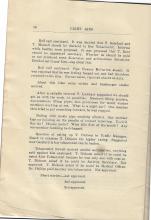30 Jul 1942, John Charter's wartime journal
Primary tabs
We have just returned from visiting Marjorie in hospital. She is much better and hopes to be out tomorrow. In the meantime Elsie has retired to bed with an ache in her throat and buzzing in her ears. But Billy Hackett who has just been to see her thinks it is nothing serious.
So far, Yvonne and I have been very lucky as far as health is concerned. We both suffered during about March, from an attack of a mild form of dysentery, or gastric flu which was pretty prevalent throughout the camp at that time. The chief snag was that we had, as part of the cure, to eat no solids for 24 hours: we were allowed rice water and tea. In those days our diet was very inadequate and a course of treatment that involved fasting was apt to pull a person down quite a lot. It was a little while after this that I weighed myself and found I was down to 138 lbs (= 134 lbs stripped). Now I am 148 lbs (144 stripped) which is practically my pre-war weight, though I am still about 10 lb less than when I arrived in Hong Kong. Yvonne, when she last weighed, has gained about 7 lbs and is now 122 lbs. Her pre-war weight was 135 lbs. Maudie Min has continued to lose and is now only 123 lbs which is too little. Her pre-war weight was 154 lbs. She is making an effort now to get hold of chocolate and tinned milk and fatten herself up. She really looks extremely fit, though she could do with more weight and finds she hasn’t as much energy as she normally has.
Our meat ration has been dwindling during the past few days and we have had so little meat that our mid-day meals recently have been meatless except for a spoonful of gravy: just rice, spinach or Chinese cabbage and a drop of gravy. Apparently the Japanese are finding the food situation here increasingly difficult to cope with. The rice we have had lately has been appallingly poor stuff. According to Harold, the shipping expert, and other people who know something about rice, it is inferior to cargo rice. ‘Cargo’ rice is the very lowest grade of rice (all broken grains, sweepings from the warehouses etc. that is loaded on cargo ships when there is absolutely no other cargo to be taken and which is loaded on chiefly as ballast. The rice we have had must be sweepings from godowns here that have already been emptied of most of the sacks of rice. It is simply filthy when it arrives. The cooks who normally wash fairly good quality rice in 3 or 4 changes of water before boiling it, have had to wash this 20 times, and still it has been dirty and smelt badly when served up. The grains are broken so small that it is impossible to prevent it being mushy when served; it is simply full of cockroach droppings and eggs, worms and grit in large quantities. The grit, being heavy, is impossible to wash out of the rice and just has to be endured. I have chipped two of my teeth by crunching small stones. One lot was so bad that everyone was given enough raw rice for three meals and we had to go through our own portion with a tea spoon, picking out the ‘roach’ droppings, worms etc. and then return it for cooking. It took over an hour to do but the appearance of the rice for the next three meals certainly made it worthwhile. However, lately there have been signs of improvement following vigorous protests from our Communal Council.
Incidentally, there has been growing criticism of the British Communal Council. It started when the committee of our blocks (2 to 5) strongly criticised the Council for making public (a month after it had been prepared) a balance sheet of the Canteen accounts, drawn up by Hampton Ross (Chartered Accountant) and bearing only his signature and not ratified by any member of the Council.
In this balance sheet there were two items about which no word of explanation was given: one stated ‘$500 cash stolen’ and the other ‘loss in goods due to theft and through breaking down goods $1,100.’ Normally in grocery shops, a loss of 1 to 1 ½ % is allowed when large quantities of cheese, butter, margarine etc. are broken down for re-selling in small quantities. But this in no way explained the huge discrepancy on the balance sheet.
It was common knowledge that, in spite of canteen guards, the store had twice been broken into and goods stolen and the till had once been robbed of $500 in small notes (such, I regret to say is the state of morality amongst some members of this British (or American or Dutch) Community, but apart from this bold and belated statement of facts, no word of explanation was offered by the Communal Council. Our committee, under the vigorous leadership of Mason, strongly criticised the B.C.C., pointing out that they had been trusted with public money and that in the absence of any critical press they were morally bound to be specially careful and explicit; that no business firm would ever dare circulate such a balance sheet to its shareholders with no explanation; and finally demanding that a committee be immediately formed to conduct a thorough investigation. Furthermore, our committee deemed it necessary, in view of public concern, to make this letter public, and place a copy of it on the notice board.

